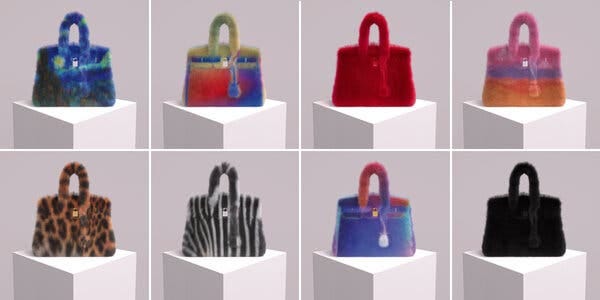Hermès Wins MetaBirkins Lawsuit
The verdict means First Amendment protections did not apply to a digital project blurring the line between art and business.
Perturbed when an artist made a digital version of its coveted Birkin handbag with a reproduction of a mature fetus inside it, the luxury fashion brand Hermès watched in shock as other iterations popped up online. A Birkin with mammoth tusks affixed to it. One sporting the Grinch’s shaggy green fur. Others stamped with van Gogh’s “Starry Night” or populated by smiley emojis.
Hermès swiftly sued the artist, Mason Rothschild, over the NFT project he called “MetaBirkins,” arguing that the company’s trademark was being diluted and that potential consumers might be fooled into buying the unaffiliated virtual goods.
The case’s ramifications extended far beyond Hermès. In some of the first litigation to scrutinize the nature of digital assets sold on the blockchain, up for debate was whether NFTs, or nonfungible tokens, are strictly commodities or art shielded by the First Amendment.
On Wednesday, a nine-person federal jury in Manhattan determined that Rothschild had infringed on the company’s trademark rights and awarded Hermès $133,000 in total damages. The jurors also found that his NFTs were not protected speech.
Rothschild’s defeat was a major blow for the NFT market, which has often described itself as part of the creator economy. But the jury determined that MetaBirkins were more similar to commodities, which are subject to strict trademark laws that prevent copycats, than to artworks where appropriation is protected.
In a statement after the verdict, Hermès said it was compelled to act to protect consumers and the integrity of its brand. “Hermès is a house of creation, craftsmanship and authenticity which has supported artists and freedom of expression since its founding,” it said.
One of Rothschild’s lawyers, Rhett Millsaps II, called it a “great day for big brands” and a “terrible day for artists and the First Amendment.”
Rothschild criticized the jury, the justice system and a luxury fashion house that he said was emboldened to determine who qualified as an artist.
“What happened today was wrong,” he said in a statement. “What happened today will continue to happen if we don’t continue to fight.”
The verdict could provide some guidance for brand owners, said Megan Noh, an art lawyer unaffiliated with the case, “about the line between works of artistic expression and commercial goods.”

